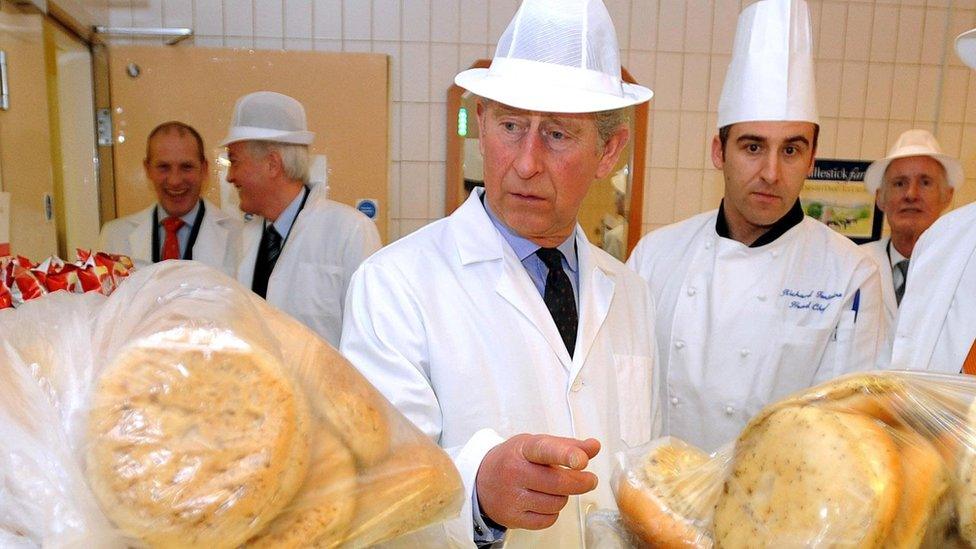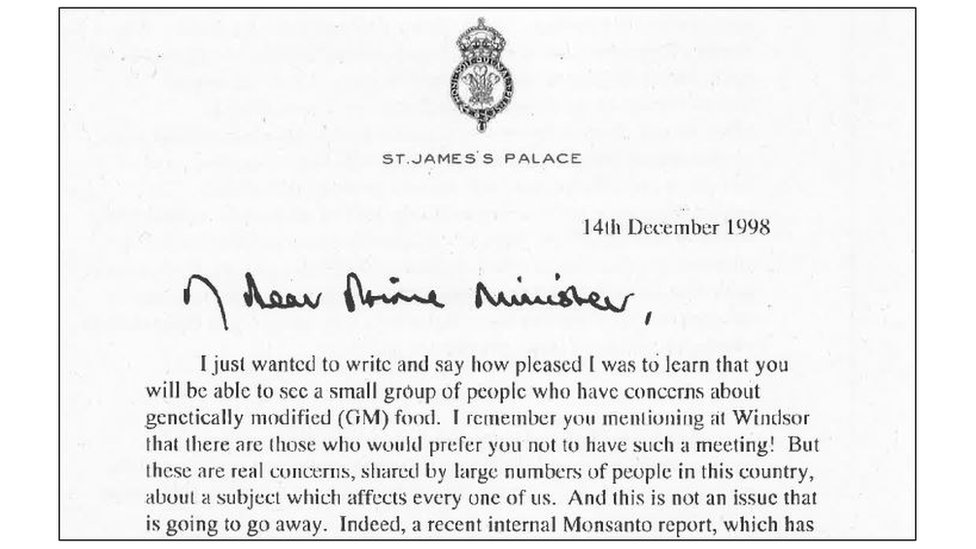Prince Charles warned Tony Blair against GM foods
- Published

The Prince of Wales wrote to the then Prime Minister, Tony Blair, in 1998, criticising the development of genetically modified foods.
In the letter, he accused the biotech industry and scientists of "increasingly frantic promotional efforts" and praised Mr Blair for agreeing to meet opponents of genetic modification, defending them from the charge that they were "hysterical, extreme and anti-progressive".
The prince told the prime minister that an unfamiliar technology was moving faster than public acceptance.
This is revealed in a copy of the letter obtained by BBC News under the Environmental Information Regulations (EIR), external - nearly three years after requesting it from the Cabinet Office and dealing with a series of objections that were overruled by the Information Commissioner.
The Cabinet Office first refused to say if it held any relevant material and then denied the letter contained environmental information, although the regulations specifically state the definition of "environmental" covers "genetically modified organisms".
But the government was required to release it, after the repeated intervention of the commissioner.
Legal battle
The case shows that Prince Charles's lobbying on environmental policy is still subject to public disclosure.

Prince Charles wrote to Tony Blair about GM food
In 2010, the government amended the Freedom of Information Act to block the release of correspondence with the heir to the throne. At the time, it was fighting a lengthy legal battle with the Guardian, external over Prince Charles's exchanges with ministers on policy issues.
The Supreme Court eventually backed the argument that under the old law the publication of the prince's "advocacy correspondence" was in the public interest and the government had to reveal letters that had been requested, from 2004-05.
The change to Freedom of Information legislation now stops further such disclosures on most topics - but not for environmental information. This is governed by the Environmental Information Regulations rather than the Freedom of Information Act, and the EIR do not contain the same absolute royal exemption that is in the amended FOI law.
And the EIR define "environmental information", external as including information on "the state of the elements of the environment, such as air and atmosphere, water, soil, land, landscape and natural sites including wetlands, coastal and marine areas, biological diversity and its components, including genetically modified organisms".

Many of Prince Charles's concerns about government policy relate to the environment. However, while it is still possible for the public to find out about them, it may involve a degree of persistence.
Here is the diary of this particular request for information. It involved me making four separate complaints about the Cabinet Office to the Information Commissioner's Office.
Diary of an information request
1 April 2015: I asked the Cabinet Office (CO) under EIR for correspondence between Prince Charles and Tony Blair about genetic modification.
1 April 2015: The CO acknowledged my request.
22 June 2015: Not having received any further answer, despite sending a chasing email, I complained to the Information Commissioner's Office (ICO) about the CO's failure to respond to the request.
14 July 2015: The ICO emailed the CO telling them to reply to me.
14 July 2015: The CO FOI Team told me, under Section 37 of the FOI Act, external (which is the royal exemption): "The Cabinet Office neither confirms nor denies that it holds information described in your request," and therefore refused to send me anything more.
17 July 2015: I asked the CO to review its decision, saying: "The information requested is environmental information, which falls under the EIR. Section 37 of the FOI Act is therefore irrelevant."
8 August 2015: Roger Smethurst, head of the CO's Knowledge and Information Management Unit, replied upholding the decision, under FOI, to neither confirm nor deny whether any relevant information was held.
15 September 2015: I complained again to the ICO, arguing that my request should have been handled under EIR.
10 November 2016: The ICO issued a decision notice, which said: "The commissioner also finds that some of the information, if held, would be environmental information… The commissioner requires the public authority to take the following steps to ensure compliance with the legislation: confirm or deny whether environmental information is held in relation to the complainant's request under the EIR and, if any information is held, either disclose it or refuse to disclose using an exception. The public authority must take these steps within 35 calendar days of the date of this decision notice."
22 December 2016: Since over 35 days had passed without any action from the CO to meet this legal deadline, I made a third complaint to the ICO.
23 December 2016: The ICO told me it was contacting the CO about this delay.
23 December 2016: The CO FOI team now told me: "We confirm that the Cabinet Office holds no information within the scope of your request that is 'environmental information' as defined in the Environmental Information Regulations 2004."
4 January 2017: I asked the CO to review this decision.

2 February 2017: Eirian Walsh Atkins, head of the CO's FOI Clearing House, upheld their decision, telling me: "I consider that the Cabinet Office was correct to confirm that no information is held in scope of your request which is environmental information as defined by the Environmental Information Regulations 2004".
28 February 2017: I complained for the fourth time to the ICO, on the basis that any information held within the scope of my request was environmental information.
12 December 2018: The ICO wrote to me to say: "As you know the Cabinet Office originally refused to confirm or deny that it held information relevant to this request, then it maintained that it did not hold any environmental information. The commissioner disagreed with this position… Following the commissioner's intervention, the Cabinet Office did subsequently accept that it held some environmental information. The commissioner advised the Cabinet Office that she would issue a decision notice if it did not issue a revised response to you on this basis… I appreciate that this case has taken a long time to resolve - but given the complexities and sensitivities of the case, it was unfortunately necessary… The commissioner has logged the fact that the information was only disclosed following the commissioner's intervention, and well outside the statutory time for compliance."
You can follow Martin Rosenbaum on Twitter at @rosenbaum6, external.
- Published13 May 2015

- Published26 March 2015